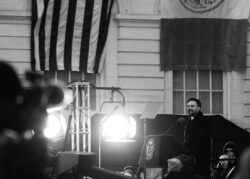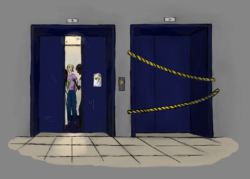It has now been almost three weeks since Mark Adamsson (SFS ‘15) passed away over Spring Break in the Dominican Republic. In the weeks that followed, family, friends, and members of the Georgetown community came together to remind the hilltop of Mark’s intelligence, charisma, and accomplishments.
However, before anything, Mark exemplified qualities that we should all strive toward. Mark represented the best in all of us and the best of our community not just because he was smart or eloquent, but because his intelligence, curiosity, and passion were always intended to better someone else’s life.
Mark towered over most of us, not simply because of his physical height, but in compassion and wisdom beyond his years.
We often struggle to make sense of loss, especially for someone so young.
It seems surreal and distant, like something out of the pages of a newspaper or storybook. Many of us still expect to see Mark stride into Lau or walk across campus in his signature brown peacoat.
Reality is slowly hitting home. Lessons in life come more from our losses than wins. Mark is gone, but what can we learn from this tragic loss?
Most people you talk to are simply waiting to impress their opinions on others. Our community is full of smart people whose cleverness compels them to assert their ideas by speaking louder and over others. Marred by short-sightedness, our small achievements and competitiveness drive us away from each other in an attempt to make it to the top.
Mark was the exact opposite. He understood that real character comes from the way that we relate to each other, how we share our beliefs and ideas, how we develop our own moral and intellectual standards, and how we realize these beliefs and standards in everyday life.
After all, you are only smart because others can recognize your intelligence and intelligence is useless unless you share it for the betterment of others.
“As iron sharpens iron, so one man sharpens another (Proverbs 27:17).” Mark understood this. Mark’s twenty-two year-old understanding of life will probably outweigh what most of us achieve in a lifetime of thinking because he understood that the key lies in who stands in front of you, not who you leave behind in your false triumphs.
We often disagreed with Mark. Whether during late-night conversations at home or over meals at the Tombs, it was easy to realize that Mark’s social worldview often differed from our personal ones.
Mark dove headfirst into intellectual debate, always stood his ground, and proved his points tactically. Yet, at the end, he was always able raise his glass and never let the intellectual interfere with the personal.
Mark’s abrupt departure from our lives leads us to often question what the future holds and how we would have approached things differently if we had a second chance.
A definite answer eludes us, but as we search for ways to fill the void that Mark left in us, we find ourselves looking back to the example that Mark set.





